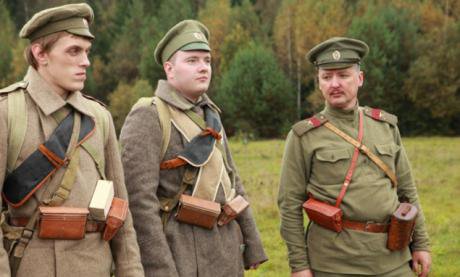Ukraine Has Crowdfunded a $100,000 Bounty on the Russian Accused of Shooting Down Flight MH-17
Ukrainians have crowdfunded a bounty of $100,000 for the capture of Igor Girkin, a Russian who acted as an insurgent leader in the Donetsk region of Ukraine back in 2014. Girkin stayed in Russia for years, but recently started bragging about being back in Ukraine on social media. He's an odd and dangerous man-a historical cosplayer, a personal fabulist, and a credibly-accused war criminal.
The campaign to capture Girkin began after his wife, Myroslava Reginska, posted a picture of him in military uniform on his Telegram. Girkin, a prolific poster, had been offline for a few days and people had begun to wonder where he was. To answer the question, where is Igor Ivanovich," she said in the post, using one of Girkin's many names. All is well! Be in touch soon." In a poster later on in the channel, Girkin confirmed that he's been back in the military since October 14, 2022.
The response from Ukrainians to this information was swift. Ukrainian activist and vlogger Serhii Sternenko offered to pay $10,000 for Girkin's capture, with Ukrainian tennis star Sergiy Stakhovsky and Ukrainian regional governor Serhiy Hayday adding their own money to the pile.
On October 16, the official Twitter and Facebook accounts for Ukraine's Defense Intelligence Agency uploaded a wanted poster for Girkin. The poster called offered $100,000 for Girkin's capture, called him a terrorist, and provided a phone number where people can call with information.
Russia's war in Ukraine has entered a new phase. Ukraine is retaking territory and is poised to push Kherson out of Ukraine and Russia's General Armageddon" has called the situation very difficult." It's among this backdrop that people like Girkin are returning to the war.
Girkin haunts a specific and horrifying place in the consciousness of Ukraine. Using the name Igor Strelkov, he first appeared in Ukraine in 2014 as the leader of an insurgent force called the Donetsk People's Republic. Using brutality and extrajudicial killings, Girkin cemented his power in the region. Soldiers under his command pulled a local mayor off the street and Girkin is credibly accused of personally murdering three prisoners during his time in Donetsk.
He is also probably one of the people responsible for the downing of the civilian Malaysian airliner MH-17 over eastern Ukraine. On July 17, 2014, a Russian surface to air missile shot down a civilian airplane over Donetsk. All 298 people aboard the plane died. Immediately after the plane went down, Girkin was bragging on social media about downing a Ukrainian plane. Prosecutors in the Netherlands are currently prosecuting Girkin and two others for this crime and a verdict is expected later this year.
Girkin, in addition to being a probable war criminal, is veiled in a self-created mythos. When he first appeared in 2014, no one was quite sure who he was. Russian media at the time portrayed the insurgent groups as grassroots rebellions against a corrupt government in Kyiv. Girkin was leading his group under the assumed name of Strelkov, a name that roughly translates to rifleman" in English. HIs soldiers called him Strelok" or the shooter." A Ukrainian news agency figured out his Moscow address and traveled to Russia in 2014 to show them pictures of Strelkov." They confirmed that the man terrorizing Ukraine was, indeed, Girkin.
 VK.com photo.
VK.com photo. Girkin has also written a memoir under a pen name called Bosnian Diarywhere he recounts his life in the Russian military during various campaigns in Chechnya, Bosnia, and Transnistria. It's hard to tell how much of the memoir is true and what's fiction. Other people have fictionalized him, too. He's appeared in propaganda in east Ukraine and someone anonymously uploaded an unflattering erotic slash fiction about him to Amazon called Sucking Strelkov.
He also loves history and is a prolific historical cosplayer. There's dozens of pictures of Girkin from his pre-Ukraine War days dressed in the garb of a White Russian and a Roman legionnaire. Ukrainians have said he works for the GRU and journalists and hackers are convinced he actually works for the FSB, the successor of Moscow's brutal KGB.
He left Ukraine in August of 2014 and began to make appearances on Russian television, radio, and the internet. He blogged prolifically and has been a critic of the Russian military in Ukraine, once going so far as to say the war in Ukraine will continue until the complete defeat of Russia," on Telegram.
He's a man surrounded by rumor and myth, much of it self-made. This isn't the first time it's been reported that he's returned to Ukraine. This time, however, it appears to be true. At least, that's what he wants people to believe.